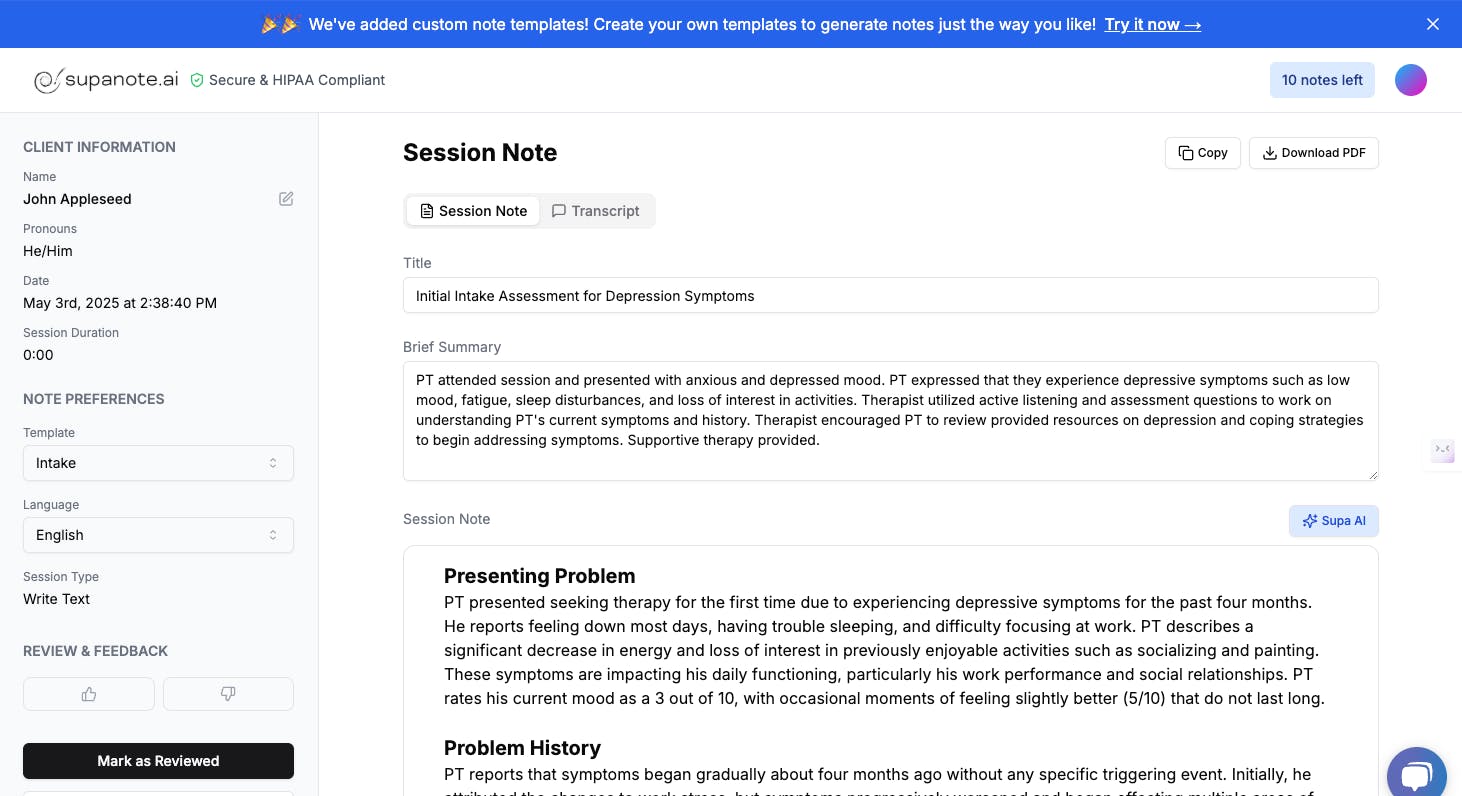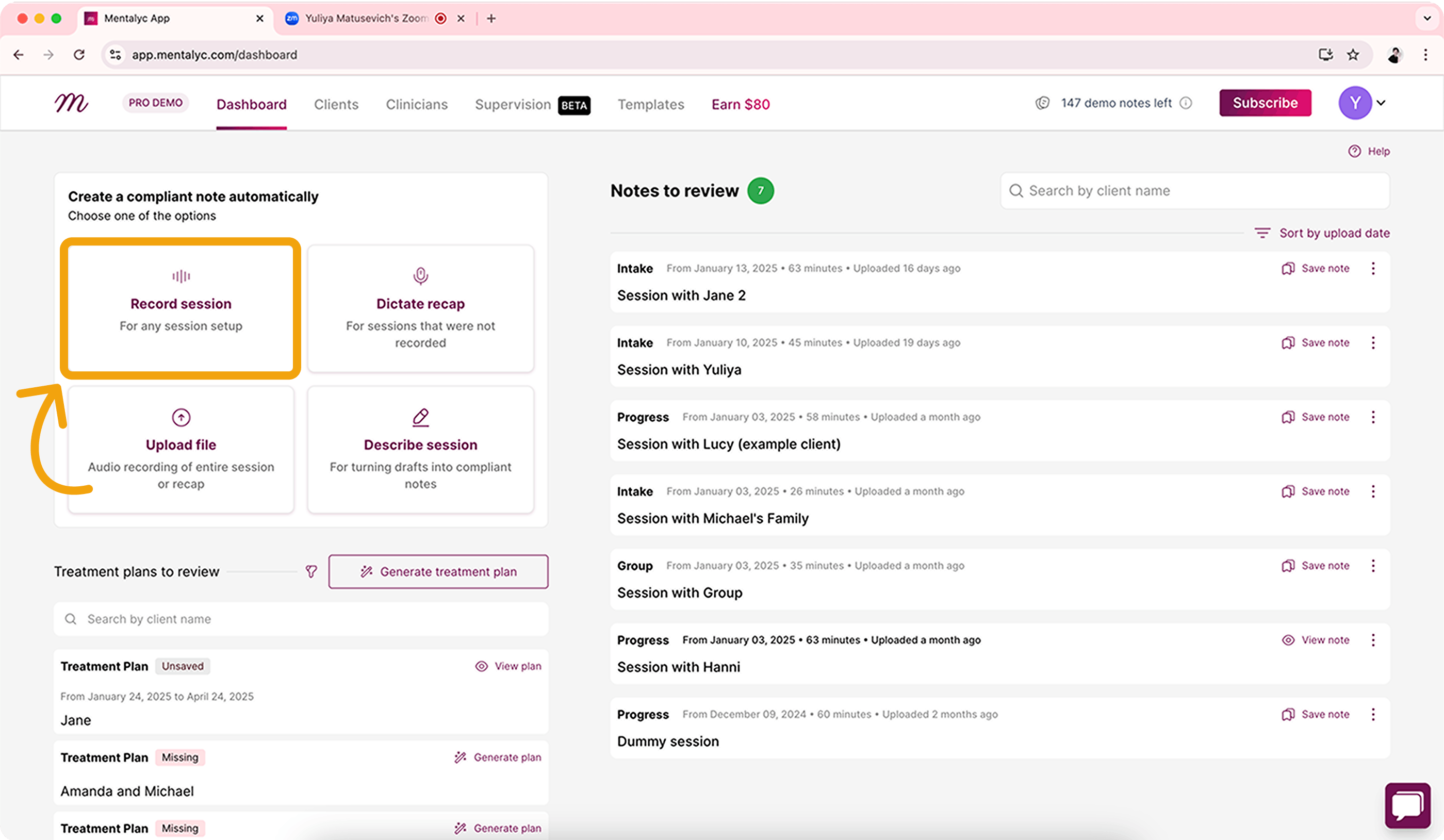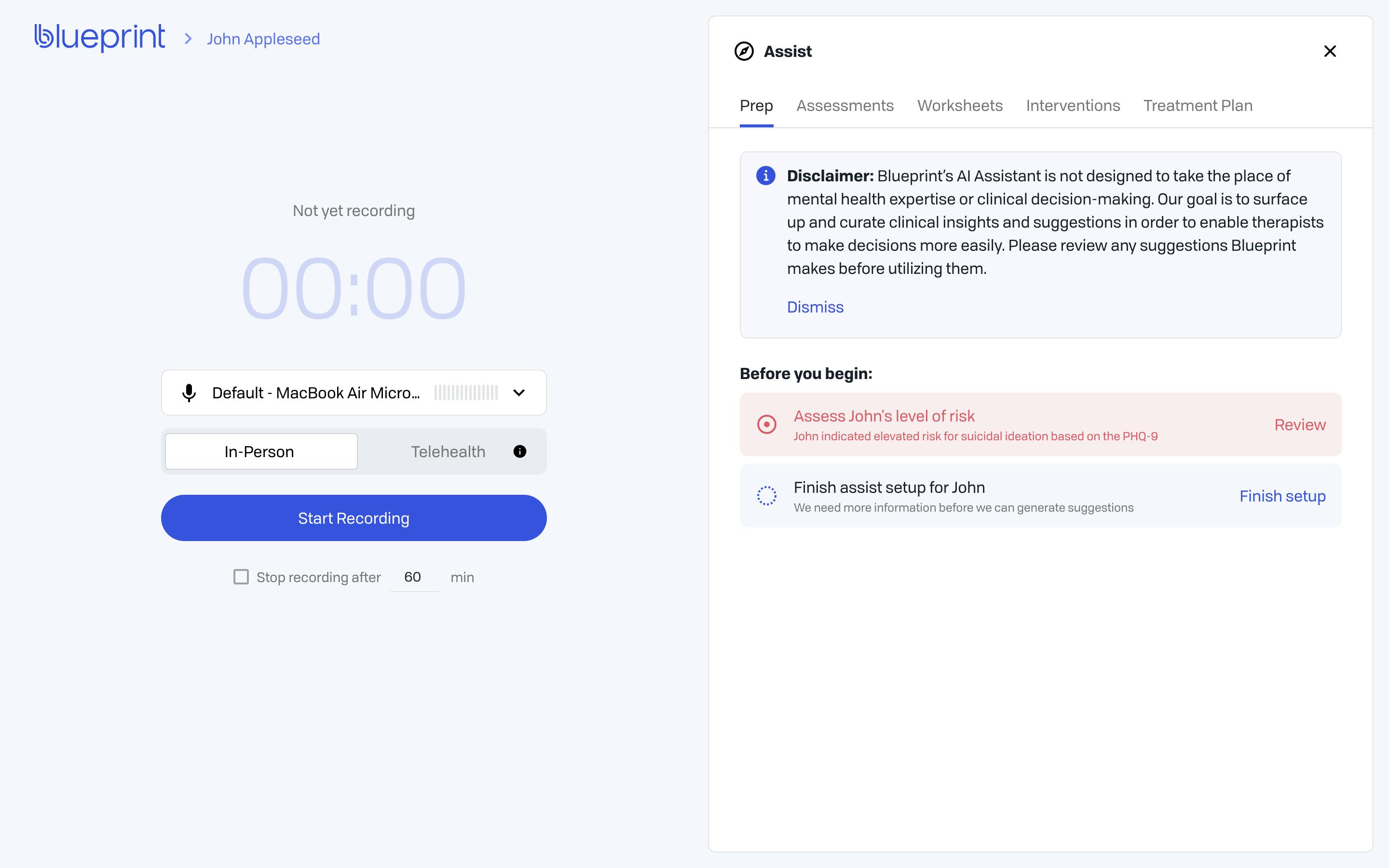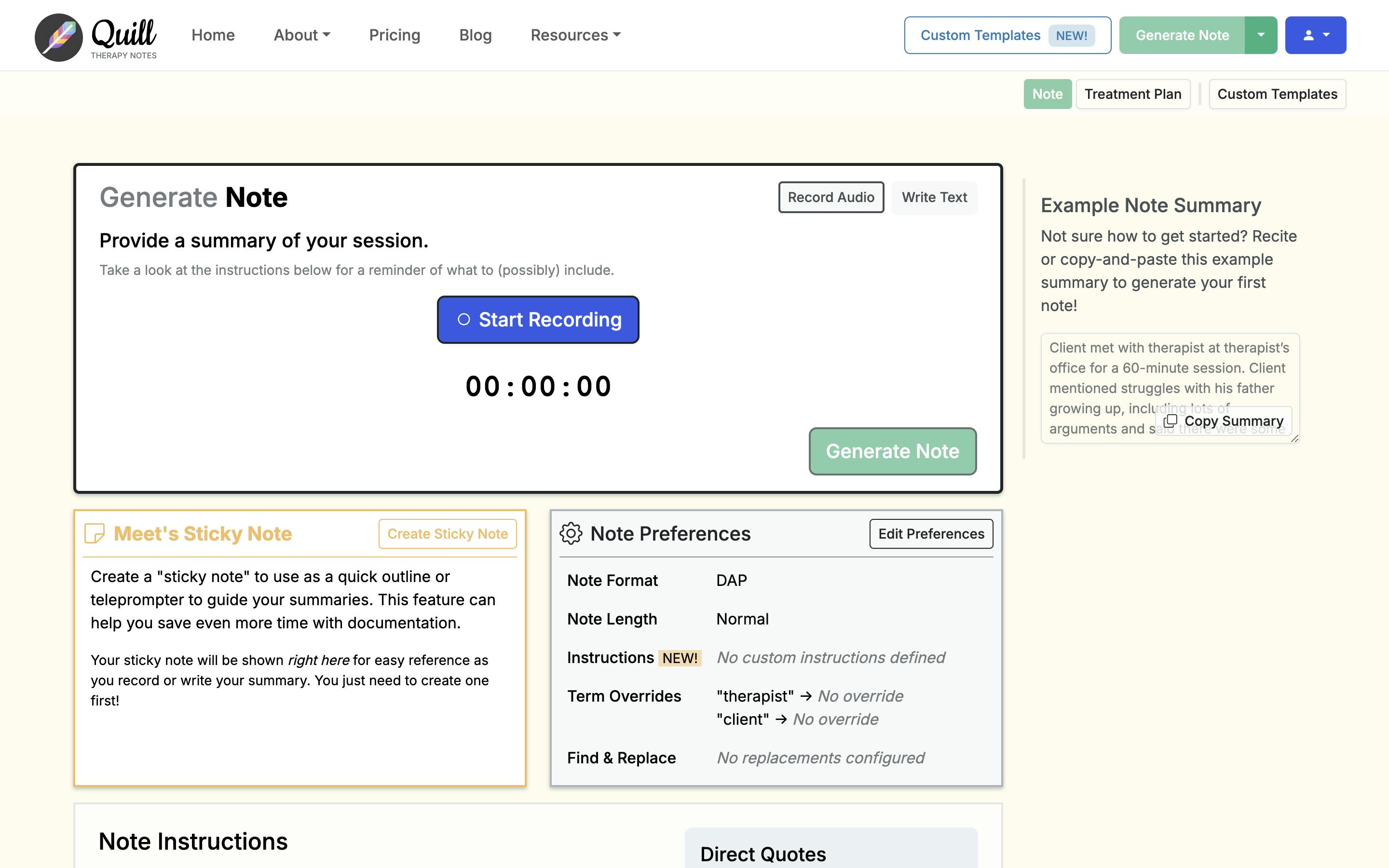If you’re feeling limited by Upheal’s features or pricing structure, you’re not alone. Many mental health professionals find themselves seeking alternatives due to integration challenges, complex interfaces, or costs that don’t align with their practice needs.
The good news is that several excellent alternatives offer better EHR integration, more flexible pricing, and specialized features for mental health providers. This comprehensive comparison will help you find the perfect fit for your therapy practice in 2026.
Why Mental Health Professionals are looking for alternatives to Upheal?
While Upheal offers solid session documentation features, many healthcare professionals find themselves seeking alternatives due to specific workflow limitations and cost considerations.
Common Concerns with Upheal
Despite its free plan for basic note taking, several practical issues drive mental health providers to explore other options:
- Limited EHR integration options - Copy-paste workflows can disrupt clinical documentation efficiency for larger practices using specific EHR systems
- Pricing structure for higher usage - Premium features at $35/month and Pro at $69/month can strain budgets for independent therapists
- User interface complexity for some users - The steeper learning curve may be more than desired for healthcare providers wanting immediate productivity
- Feature gaps for specific therapy types - Specialized modalities like couples therapy or group work may lack targeted customizable templates
These limitations don’t make Upheal inadequate. They highlight why mental health professionals often need solutions better aligned with their specific practice management requirements and budget constraints.
Top 5 Upheal Alternatives
Here are the most compelling alternatives. Each excels in different areas to meet your specific practice needs.
1. Supanote - Best for Native EHR Integration

Supanote stands out as the only AI note taking tool built specifically for mental health with true native EHR integration. Super Fill button automatically populates your EHR with one click, eliminating the copy-paste workflow that slows down other platforms.
- Native EHR autofill - Direct integration with SimplePractice, Valant, and TherapyNotes etc through the Super Fill button
- Mental health specialization - Purpose-built for therapy sessions with understanding of clinical documentation terminology and treatment planning
- Deep personalization - Learns your documentation process and client-specific language over time
- Superior human support - Known for fast, responsive customer service with real people behind every interaction
- Comprehensive note types - Supports progress notes, treatment plans, intake summaries, and crisis documentation
Pricing: Basic plan starts at $29.99/month for 40 notes. Includes a 14-day free trial and 20% annual discount.
Best suited for: Independent therapists and small group practices using SimplePractice, Valant, or TherapyNotes who want seamless EHR workflow.
2. Mentalyc - Best for Custom Workflows

Mentalyc offers the most comprehensive template system among alternatives. This makes it ideal for therapy practices that need standardized documentation processes across multiple therapists.
- Extensive SOAP/DAP templates - Pre-built customizable templates for different therapy modalities including CBT, DBT, and EMDR
- Team collaboration features - Share templates and maintain consistency across your practice
- Strong template library - Ready-to-use formats for various clinical scenarios and treatment approaches
- Practice management integration - Works with major EHR systems through secure copy-paste workflows
- Quality assurance tools - Review and approval systems for supervised clinicians
Pricing: Mini plan at $19.99/month for 40 ai generated notes. Team discounts available with 16.7% annual savings.
Best suited for: Larger practices with standardized processes, supervision requirements, and multiple clinicians needing consistent note formats
Blueprint

Blueprint’s unique session-based pricing structure makes it perfect for mental health professionals with variable caseloads. Their recent Blueprint 2.0 update significantly improved accuracy and user experience for independent therapists.
- Session-based pricing structure - Pay only for therapy sessions you document, not a fixed monthly fee
- Blueprint 2.0 improvements - Enhanced AI powered accuracy and faster processing times for progress notes
- Variable caseload optimization - Cost-effective for mental health providers with fluctuating client numbers
- Flexible session documentation - Supports both session recordings and manual note taking entry
Pricing: Starting at $29/month with session-based billing, includes promotional offers of 50% off first three months
Best suited for: Mental health professionals with fluctuating session volumes, part-time practitioners, or those building their caseload who prefer pay-as-you-go pricing structure
4. Quill Therapy Notes - Best for Summary-Based Notes

Quill takes a different approach by focusing on summary-based clinical documentation rather than session recordings, appealing to healthcare professionals who prefer multiple input methods.
- No session recordings required - Generate progress notes from brief session summaries you provide
- Summary-based note generation - Input key points and let AI generated systems expand them into full clinical documentation
- Simple, straightforward user interface - Clean design without advanced features that might overwhelm users
- Unlimited notes documentation - No per-note limits on their individual plan for larger practices
- Privacy-focused approach - No audio storage since session recordings aren’t required
Pricing: Individual plan at $20/month for unlimited notes with 14-day free plan trial
Best suited for: Mental health professionals who prefer not to record sessions, those with data security concerns about audio storage, or practitioners who like maintaining control over initial note content
5. Berries - Best for Real-Time Recording

Berries offers real-time session recordings and session analytics features, with strong international support that makes it unique among mental health documentation tools for healthcare providers.
- Real-time therapy sessions recording - Live transcription and note generation during your client sessions
- Multilingual support - Supports multiple input methods for diverse client populations
- Advanced session analytics - Detailed analytics on session patterns and client progress for enhancing efficiency
- Robust free plan - Generous 20 sessions initially, then 10 sessions monthly on free plan tier
- Comprehensive session analytics - Track therapy outcomes and session effectiveness over time for patient care
Pricing: Free plan with 10 sessions monthly, paid plan at $99/month with frequent promotional discounts
Best suited for: International therapy practices, mental health providers serving multilingual populations, and healthcare professionals who want detailed session analytics and real-time documentation
Upheal Alternatives Comparison Table
Here’s a quick comparison of the top alternatives to help you make an informed decision:
Tool | Starting Price | Best Feature |
|---|---|---|
Supanote | $29.99/month (14-day free trial) | Native EHR autofill with Super Fill button |
Mentalyc | $19.99/month (40 notes) | Comprehensive SOAP/DAP templates |
Blueprint | $29/month | Session-based pricing model |
Quill Therapy Notes | $20/month (unlimited) | No session recording required |
Berries | $99/month (20 sessions free initially) | Real-time recording with multilingual support |
Each alternative offers unique strengths, with pricing and features varying significantly to match different practice needs and workflows.
Quick Comparison Overview
Each alternative serves distinct practice needs for mental health professionals:
- Supanote excels in EHR integration and mental health specialization with AI powered features
- Mentalyc leads in customizable templates and team collaboration for larger practices
- Blueprint offers flexible session-based pricing for independent therapists
- Quill provides recording-free documentation focused on note taking
- Berries delivers advanced features and multilingual support with detailed analytics
Your choice depends on your current EHR system, documentation preferences, practice size, and specific feature requirements. Most offer free plan options, allowing you to test functionality before committing to a subscription.

Key Factors to Consider When Choosing
Before switching from Upheal, you need to evaluate these critical factors to find the right alternative that truly fits your practice needs.
EHR Integration Requirements
Your workflow efficiency depends heavily on how the tool connects with your existing EHR system. Native integration options like Supanote’s Super Fill button eliminate copy-paste workflows entirely, while others require manual transfer of progress notes. Check if your EHR platform (SimplePractice, TherapyNotes, Valant) is directly supported.
Consider setup complexity—some AI tools require extensive configuration while others work immediately.
Pricing Structure
These alternatives offer vastly different pricing models that can significantly impact your costs. Per-note models like Supanote ($29.99/mo for 40 notes) work well for lower volumes, while unlimited notes like Quill Therapy Notes ($20/month unlimited) benefit high-volume practices. Most tools offer free trials—Supanote provides 14 days, while Berries offers a robust free plan with 20 initial sessions.
Annual discounts range from 15-20% across most platforms.
Specialization and Features
Mental health-specific AI tools like Supanote and Mentalyc understand therapy practices better than general medical platforms. Look for SOAP/DAP templates that match your documentation process. Customization capabilities vary significantly—some tools learn your preferences over time, while others offer extensive template libraries.
Consider whether you need team collaboration features, multilingual support, or specific therapy modality templates.
Making Your Decision
Before switching from Upheal to any alternative, you need to evaluate your specific practice needs and workflow requirements.
Essential Questions to Consider:
- Current EHR system - Does the alternative offer seamless integration with your platform (SimplePractice, TherapyNotes, etc.) or just copy-paste functionality?
- Monthly note volume - Calculate your average to determine if per-note pricing ($0.50-$0.70 each) or unlimited notes plans ($20-$99/month) offer better value
- Documentation preference - Do you want to record full therapy sessions for AI transcription, or do you prefer inputting session summaries manually?
- Budget constraints - Factor in your current Upheal costs against alternatives, considering annual discounts (typically 15-20% savings)
- Practice size - Independent therapy practices have different needs than larger practices requiring team collaboration features and user interface management
Most alternatives offer 7-14 day free trials. Test 2-3 options with your actual client sessions before committing. Pay attention to how each valuable tool handles your specific therapy modalities and integrates with your existing workflow.
Frequently Asked Questions
Q: Can I switch from Upheal without losing my existing notes?
A: Most platforms don’t directly import notes from other systems due to privacy regulations. However, you can typically export your Upheal data and manually transfer essential information. Start your new platform alongside Upheal during a transition period to ensure continuity.
Q: Which alternative offers the best value for high-volume practices?
A: Quill Therapy Notes offers unlimited notes for $20/month, making it ideal for high-volume practices. Supanote and Mentalyc also start at $20/month with generous note allowances. Compare the monthly note limits against your actual usage to find the best value.
Q: Which alternative offers the best value for high-volume mental health professionals?
A: Quill Therapy Notes offers unlimited notes for $20/month, making it ideal for high-volume mental health practices. Supanote and Mentalyc also start at $20/month with generous note allowances for healthcare professionals. Compare the monthly note limits against your actual usage to find the best value.
Q: Do these alternatives require session recordings like Upheal?
A: Not all AI note taking tools require recordings. Quill Therapy Notes works entirely with manual input methods without session recordings. Others like Supanote and Mentalyc support multiple input methods, giving mental health professionals flexibility in their note generation workflow.
Q: How long does it typically take to set up EHR integration?
A: Supanote’s native integration typically takes 10-15 minutes for seamless integration with supported EHRs. Other AI powered platforms may require API connections or rely on copy-paste workflows for session documentation, which can take 30-60 minutes to configure properly.
Q: Are there any HIPAA compliance concerns when switching platforms?
A: All mentioned alternatives are HIPAA compliance platforms designed for healthcare providers. However, always review the Business Associate Agreement (BAA) before signing up to ensure data security. Most platforms provide BAAs as part of their standard service for mental health documentation.
Q: Can I try multiple alternatives simultaneously?
A: Yes, most platforms offer free plan options or free tiers for behavioral health providers. You can test 2-3 ai tools simultaneously using different client sessions. This approach helps you make informed decisions about workflows and advanced features before committing to annual plans.
Q: Which alternative works best for larger practices?
A: Mentalyc offers the strongest team collaboration features with customizable templates and structured documentation workflows. Supanote also supports multiple users with individual personalization for independent therapy practices. Consider your need for centralized practice management versus individual customization.
Q: What happens if I exceed my monthly note limit?
A: Most platforms automatically upgrade you to higher tier plans or charge per additional AI generated notes. Blueprint’s session-based model and Quill’s unlimited option eliminate overage concerns for independent therapists. Check each platform’s overage policies before committing.
Conclusion
Each of these alternatives serves different practice needs for mental health professionals. Supanote stands out for its native EHR integration and deep personalization, while others excel in specific areas like custom templates or session-based pricing structure.
The best choice depends on your EHR system, progress notes volume, and workflow efficiency preferences. These ai note taking solutions can significantly reduce administrative burden while maintaining comprehensive session documentation quality.
Take advantage of free plan trials to test how each platform fits your daily practice management needs. Many healthcare professionals find these ai generated solutions enhance patient care while reducing time spent on administrative tasks.
Whether you need soap note format templates, session analytics, or supports multiple input methods, there’s a valuable tool that matches your documentation process. The right platform will automate progress notes creation while allowing therapists to focus on client care and treatment plans development.


